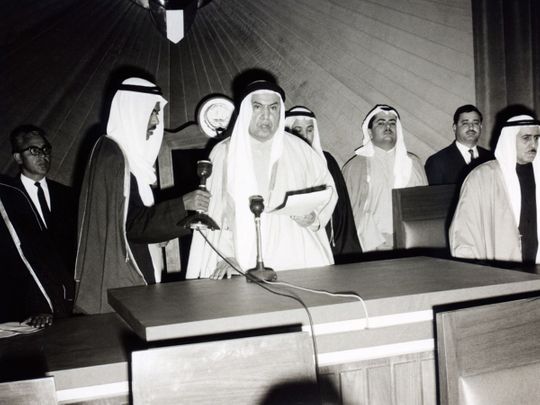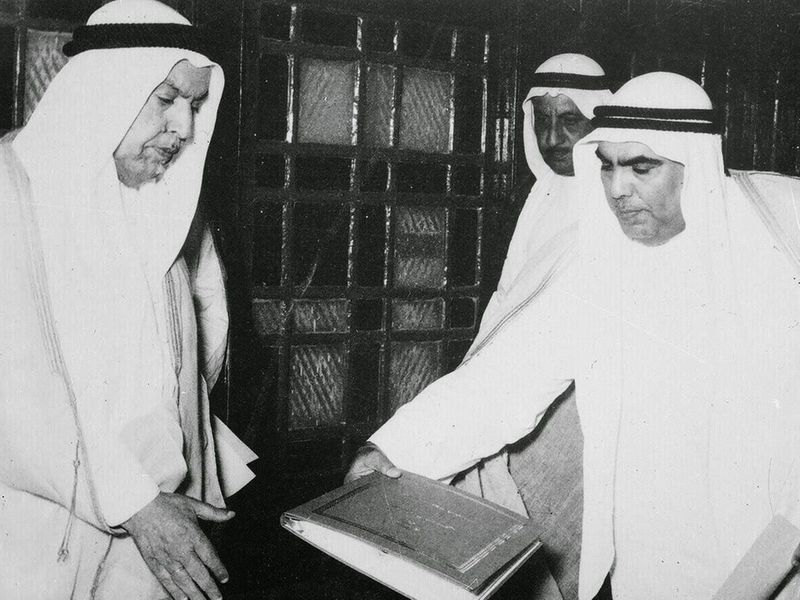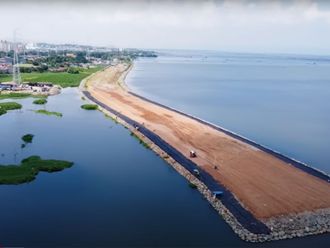
Kuwait City: On November 24, 1965, the first Emir and the 11th ruler of Kuwait, Sheikh Abdullah Al Salem Al Sabah passed away at the age of 70.
The late Emir was hailed as the ‘father of democracy’ as he ushered in policies that shaped Kuwait’s modern political and social fabric.
It’s been 55 years since Sheikh Abdullah’s passing but his legacy still remains, as he negotiated Kuwait’s independence from the British and is regarded as the architect of Kuwait’s constitution.
Early years
As the eldest son of Kuwait’s ninth ruler, Salem Al Mubarak Al Sabah, Abdullah Al Salem gained an important position in the family and was able to participate in local affairs at an early age.
When the first legislative council (known in Arabic as Majlis Al Tashrey) was formed in 1938, Abdullah Al Salem was appointed as its head. Although the council only lasted six months, they set the basic laws for the formation of a government system. Shortly after, a second legislative council was formed with 20 members, 12 of whom were from the previous council and they reinstated Abdullah Al Salem as the president.
Due to his active participation in Kuwait’s administrative affairs, Abdullah Al Salem had the upper hand and increased his chances of becoming Kuwait’s next ruler.
After the passing of his cousin, Ahmed Al Jaber Al Sabah, Abdullah Al Salem assumed the position as Kuwait’s ruler in 1950.
“While it was a smooth transition of power, Abdullah Al Salem was not automatically instated as the ruler as the British failed to recognise him unless he let go of some of his advisers,” Abdulaziz Al Saif, a political analyst, told Gulf News.
1950-1961
After 1950, while Kuwait was still under the British mandate, Abdullah Al Salem had a huge positive impact on Kuwait as he steered it towards becoming a modern state and initiated Kuwait as the first welfare state in the Middle East, thus enhancing the standard of living.
Everything from health care and education to housing and employment were enhanced under his reign, which were provided not only to Kuwaitis but to expats as well.
This was possible as Abdullah Al Salem took power shortly after Kuwait started exporting its oil, thus he was able to take advantage of the oil boom and use state revenue to fund social programmes.
He also advanced Kuwait’s cultural scene as the first cinema in Kuwait was opened in 1954. Shortly afterwards, in 1958, the famous Al Arabi magazine was founded to emphasise Arabic literature and Kuwait hosted the first Arab writer conference.
In terms of foreign policy, Abdullah Al Salem strengthened ties with other Arab countries. Whilst still trying to maintain ties with the British, he also maintained alliances with Arab nationalists, especially during the 1956 Suez Crisis. In 1957, he decided to boycott the import of Israeli goods in an effort to show solidarity with the Palestinian people.
From ruler to Emir
Although Kuwait was their protectorate since 1899, the British faced resistance during the rule of Abdullah Al Salem as the ruling family and government tried to hinder the UK’s ambitions of controlling Kuwait’s internal affairs.
With growing cries for full freedom, the Kuwaiti people wanted an end to the British protectorate.
By then Abdullah Al Salem understood that it was important, at that period more than ever, that Kuwait gained its full independence and complete sovereignty.
Then on June 19, 1961 Abdullah Al Salem signed an independence treaty with Britain, in the presence of Sir George Middleton, Britain’s Chief Political Resident in the Gulf.
While the treaty was signed in June, Kuwait’s National Day was changed to February 25 in 1963 to coincide with the date that Abdullah Al Salem became ruler of Kuwait back in 1950.
Architect of constitution
After independence, Kuwait entered a new era and began putting in place new systems that would determine how the country is run and governed. The main and most important document that was created after independence was the Kuwaiti constitution.
The current Kuwaiti constitution is in fact the second constitution, as the first one was created solely by Abdullah Al Salem in 1961 and was a temporary constitution that stipulated it be dissolved once a new constitution was put into place.
In an effort to create a democratic constitution, Abdullah Al Salem set up the constituent council (in Arabic known as Majlis Al Tasesy) in 1961. The council was made up of 20 elected members and a number of ministers that were tasked with reviewing and approving the constitution. Although they didn’t draft the constitution, they were the ones who reviewed it before it was made final. It is important to note that Abdullah Al Salem barred the ministers that were on the council from voting.
The constitution was drafted by a committee of five members that was elected by the constituent council and was headed by Sheikh Saad Abdullah Al Sabah (who went on to be Kuwait’s fourth Emir). Two Egyptians worked as consultants to the committee, as Kuwait did not have people who specialised in constitutional law and because Egypt’s constitution is similar to Kuwait’s.
Once the committee was done with the draft and the council voted on it, on November 11, 1962 the constituent council presented the final constitution to Abdullah Al Salem, which he approved and signed into effect.
How the constitution came to be
There are three types of ways a constitution can be established.
The first method, a grant constitution (known as Menha in Arabic) is when the ruler grants the people a constitution. The second kind, called the contract, (known in Arabic as Aqed) is when the constitution is written between both the people and the government, where the both agree on it. The last one is the Constituent Assembly, (known in Arabic as Jameya Al Taseseya), which is when elected citizens propose the drafting or adopting of a constitution.
Al Saif explained that the Kuwaiti constitution can be interpreted as all three, since the 1961 constitution (which served as a foundation for the final constitution) was drafted solely by Abdullah Al Salem. Meanwhile, it can also be seen as a Constituent Assembly constitution since the 20 members who voted on the drafted constitution were elected members from the Kuwaiti public.

“The third and most likely option is that the Kuwaiti constitution is a contract, because those who discussed it were the elected members who represent the people. But Saad Al Abdullah was the representative of the government and the family and he was constantly discussing and changing it, before the Emir approved the constitution. And in my opinion Saad Al Abdullah had a negative role during the process,” Al Saif said.
Although Abdullah Al Salem was the architect of the constitution, there were several reasons why he established it. “First, there were demands being made from the Kuwaiti people. Second, in 1959 during an event at one of the sports clubs, calls were made to create a democracy. The last reason was [then Iraqi leader] Abdul Karim Qasem’s claims to take over Kuwait,” explained Al Saif.
He pointed out, “It is important to note that no leader, anywhere in the world, wakes up one morning and decides to give up power.”
Kuwaiti constitution
The Kuwaiti constitution, the most liberal in the region, is made up of 183 articles that states everything from the role of the legislative and executive branches to financial and military affairs, in addition to the public’s rights and duties.
The first section of the constitution, consisting of six articles, clearly states Kuwait is an independent Arab country [Article 1] and that “the System of Government in Kuwait shall be democratic” [Article 6].
Therefore, Kuwait was established as a constitutional monarchy.
According to the constitution, the parliament and government have the right to put forth a proposal to change any article in the constitution. For the amendments to happen two thirds of the parliament and the Emir must approve on the amendments.
While many have tried to amend various articles in the constitution, it has yet to be changed. Therefore, many refer to the Kuwaiti constitution as rigid as it is very hard to change.
National Assembly and the constitution
The constitution set the foundation for Kuwait’s legislative branch, the National Assembly, otherwise known as parliament.
The first parliamentary elections were held on January 23, 1963, where a total of 205 candidates ran across 10 electoral districts.
During the first parliamentary session, Abdullah Al Salem, although ruler since 1950, took the constitutional oath in front of the National Assembly, adhering to the Article 60 of the constitution.
From there on in, the constitution served as the backbone of everything legal, financial and political in Kuwait.
“The constitution is important to protect people’s rights, organise society and clarify the role of the various branches of government,” Al Saif said.
The parliament has several duties from passing laws to serving as the voice of the people. In addition, according to the Kuwaiti constitution, the parliament can hold ministers, including the prime minister, accountable by filing a confidence vote.
Although no minister has actually been removed due to a no confidence vote, a number resigned prior to the vote fearing that they will be removed.
Another important democratic aspect of the constitution is that it stipulates that there always has to be a parliament. In the event that the parliament is dissolved elections need to take place within two months.
“I do not think that the constitution is fully respected in Kuwait, especially since the parliament was dissolved in 1976 and then again in 1986 and no elections were held, both times, for five years. So in the 58 years of us having a constitution, for 10 of those years we were without a parliament [from 1976-1981 and then 1986-1991]. This is a clear violation of the constitution,” Al Saif explained.








